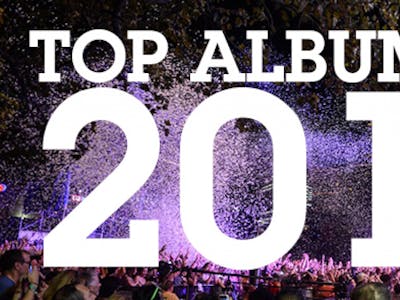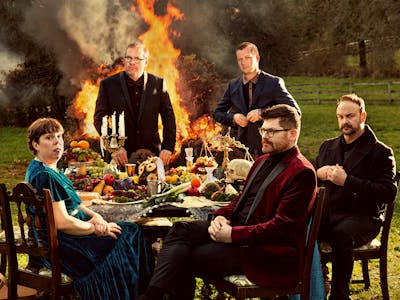The Decemberists are miles removed from the club-dwelling road warriors that turned out four stellar LPs in as many years between 2002 and 2006--the same period of time it took them to make What A Terrible World, What A Beautiful World, their seventh album and fourth on Capitol Records. Ever self-aware, front man Colin Meloy covers this in the opener, “The Singer Addresses His Audience”: “We know you grew your arms around us in hopes we wouldn’t change/But we had to change some.” The Portland, OR quintet has a back catalogue filled with sagas of international espionage (“The Bagman’s Gambit”), crowd-participation seafaring nautical epics (“The Mariner’s Revenge Song”), and Shakespearian teenage tragedy (“We Both Go Down Together”). But the new songs reach for the back rows of amphitheaters and arenas (and, yes, festival fields) and the hearts of a coast-to-coast NPR audience. Gone is the reckless abandon of their scattershot early work, but it’s been replaced by a self-assured maturity.
This musical direction was first signaled on 2011’s The King Is Dead. The album was a huge step away from the Daltreyan high-concept prog of The Hazards of Love, heavy on R.E.M. jangle pop, pastoral folk anthems, and Gillian Welch’s heavenly harmonies. It was a surprising release at the time, simple and unpretentious, but with four years of hindsight, The King Is Dead stands as one of their best albums. The characters and literary references aren’t dumbed down (“Calamity Song” draws on Infinite Jest), but they do tend to occupy more recent centuries than Eli the Barrowboy. The extensive tours behind King left the band exhausted and taking stock of their career. They took a full three years away from the road, the longest break in the band’s history, during which keyboardist Jenny Conlee battled (and beat) breast cancer. Between albums, Meloy published three volumes of children’s fiction while the other four members released four records with their bluegrass side project Black Prairie.
They’ve returned refreshed with a new album that’s full of solid mid-tempo folk rock. Snarled guitar solos squeal and grand pianos chime, but acoustic guitars and bouzoukis still form the core of The Decemberists’ sound. The Morricone intro of “Easy Come, Easy Go” begs for the Man with No Name to enter stage left, and the lost-weekend disappointment of “Mistral” (“So we’ve already wrecked the rental car/And I’ve already lost my way”) is as direct as their lyrics have ever been. But Meloy abandons characters altogether on “12/17/12,” written in the immediate aftermath of the Sandy Hook massacre. It’s simple, short, and raw; at long last, the mask pulled away from his face. He looks at his family and fortunate life, “Here with my heart so whole, while others may be grieving.” The gravity of the album title comes clear suddenly: “And oh my god, what a world you have made here/What a terrible world, what a beautiful world.” The italics are his, not mine.
Most importantly, The Decemberists remain a big, powerful, passionate live force. At their shows, they can (and do) call on all periods of their increasingly extensive discography, inciting a raucous sing-along with “16 Military Wives,” silencing chatter with the balladry of “Grace Cathedral Hill,” or nimbly working through the multi-part suite of “The Crane Wife.” This is music designed for a summer sunset and a field full of people, and the kind folks at Bunbury have decided to give us just that.
Enter here to win a pair of 3 Day Passes to Bunbury Music Festival HERE!




